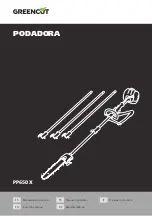
being pulled off balance.
■
Cut only when visibility and light are adequate for you
to see clearly.
LIMBING AND PRUNING
See Figures 2 and 12.
■
Plan the cut carefully. Be aware of the direction in
which the branch will fall.
■
Branches may fall in unexpected directions. Do
notstand directly under the branch being cut.
■
The most typical cutting application is to position the
unit at an angle of 60° or less, depending on the
specific situation. See Figure 2.
■
The long reach of the unit allows the operator to
prune branches or limbs that are normally out of
reach.
■
Long branches should be removed in several stages.
■
Cutting lower branches first will allow the top
branches more room to fall.
■
Work slowly, keeping both hands on the pole pruner
with a firm grip. Maintain secure footing and balance.
■
Keep the tree between you and the blade while
limbing. Cut from the side of the tree opposite the
branch you are cutting.
■
Do not cut from a ladder, this is extremely dangerous.
Leave this operation for professionals.
■
Do not use for felling or bucking.
■
When pruning trees it is important not to make the
flush cut next to the main limb or trunk until you have
cut off the limb further out to reduce the weight. This
prevents stripping the bark from the main member.
Underbuck the branch 1/4 way through for your first
cut, your second cut should overbuck to drop the
branch off. Now make your final cut smoothly and
neatly against the main member so the bark will grow
back to seal the wound. See Figure 12.
WARNING
Never climb into a tree to limb or prune. Do not
stand on ladders, platforms, a log or in any
position which can cause you to lose your
balance or control of the unit.
MAINTENANCE
WARNING
When servicing use only identical replacement
parts. Use of any other parts may create a
hazard or cause product damage.
Avoid using solvents when cleaning plastic parts.
Most plastics are susceptible to damage from
various types of commercial solvents and may
be damaged by their use. Use clean cloths to
remove dirt, dust, oil, grease, etc.
WARNING
Do not at any time let brake fluids, gasoline,
petroleum-based products, penetrating oils, etc.
come in contact with plastic parts. They contain
chemicals that can damage, weaken or destroy
plastic.
WARNING
Do not attempt to modify this tool or create
accessories not recommended for use with this
tool. Any such alteration or modification is
misuse and could result in a hazardous condition
leading to possible serious personal injury.
TRANSPORTING AND STORING
■
Always place the blade cover on the blade before
storing or transporting the pole pruner. Use caution to
avoid the sharp teeth of the blade.
■
Clean the pole pruner thoroughly before storing.
Store the pole pruner in a dry, well-ventilated place
that is inaccessible to children. Keep away from
corrosive agents such as garden chemicals and de-
icing salts.
DISPOSAL
Waste electrical products should not be disposed of
together with household waste. Please recycle where
facilities exist. Check with your local authority or retailer
for recycling advice.
12
English
GB
F
D
E
I
P
NL
S
DK
N
FIN GR
HU
CZ
RU
RO
PL SLO HR
TR EST
LT
LV
SK
BG
OPS-1801_25 lgs manual 12/13/03 9:11 AM Page 12
















































